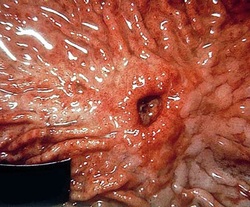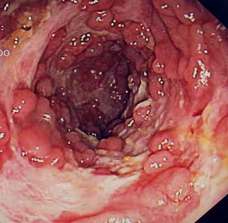Diseases, or disruptions in homeostasis that effect the body, causing it to become "off-balanced" and act differently then when healthy, effects all living things from time to time. After learning about the many parts and purposes of the digestive system, we will continue onto the diseases that, if they do happen to enter into the digestive tract, whether that is through the mouth or anus, effect the body.
Diseases
Ulcers

A stomach ulcer, also known as peptic ulcers, are a small erosion/hole in the digestive system from the stomach on. Ulcers that form in the stomach are called gastric ulcers. Ulcers are NOT contagious. The disease is common, affecting 1 million of people each day. The ulcer size can range from1/8 of and inch to ¾ of an inch.
The reason you get stomach ulcers, are because the lining of gastric glands on your stomach produce too much hydrochloric acid, which usually helps break down your food. Another way to get a stomach ulcer is by digesting too much inflammatory medications, like aspirin. Also tobacco is very bad for your digestive system.
The main symptom is a burning feeling in you stomach, lasting 3 hours to 30 minutes. Some people mistake this as heartburn, indigestion or just hunger. Sometimes the pain comes right after eating. Weeks of pain can be followed by weeks with out pain. Pain can be relived by eating dairy eating of resting.
Ulcers mainly affect the nerves surrounding it. There then may be tearing in the digestive wall, and swelling around the ulcer.
The reason you get stomach ulcers, are because the lining of gastric glands on your stomach produce too much hydrochloric acid, which usually helps break down your food. Another way to get a stomach ulcer is by digesting too much inflammatory medications, like aspirin. Also tobacco is very bad for your digestive system.
The main symptom is a burning feeling in you stomach, lasting 3 hours to 30 minutes. Some people mistake this as heartburn, indigestion or just hunger. Sometimes the pain comes right after eating. Weeks of pain can be followed by weeks with out pain. Pain can be relived by eating dairy eating of resting.
Ulcers mainly affect the nerves surrounding it. There then may be tearing in the digestive wall, and swelling around the ulcer.
Crohn's Disease

Is a ongoing disease that inflames your digestive tract. It mainly affects the area in the lower part of he small intestine. Swelling penetrates deep into the walls of the organ. This causes pain and makes the intestine mainly open, causing diarrhea. Crohn’s is hard to diagnose, because it is similar to bowel disorders. It affects men and women and seems to run in families. 20% of people with Crohn’s have a relative with Crohn’s aswell. Also, the Jewish heritage have a higher risk of this disease then others.
There is not one answer on how Crohn’s disease is caused. A common theory is the immune system mistakes bacteria for food.
Symptoms are pain in the abdnominal area, rectal bleeding an diarrhea. Also, children with this disease my have stunted growth.
The most common complication is blockage of the intestine. The wall will swell and become thicker making it harder for things to pass through. Crohn’s can cause soars of ulcers all over the passages that lead out of the body. To remove the ulcer it may require surgery.
Certain drugs and pain medicine will help resolve the pain.
There is not one answer on how Crohn’s disease is caused. A common theory is the immune system mistakes bacteria for food.
Symptoms are pain in the abdnominal area, rectal bleeding an diarrhea. Also, children with this disease my have stunted growth.
The most common complication is blockage of the intestine. The wall will swell and become thicker making it harder for things to pass through. Crohn’s can cause soars of ulcers all over the passages that lead out of the body. To remove the ulcer it may require surgery.
Certain drugs and pain medicine will help resolve the pain.
